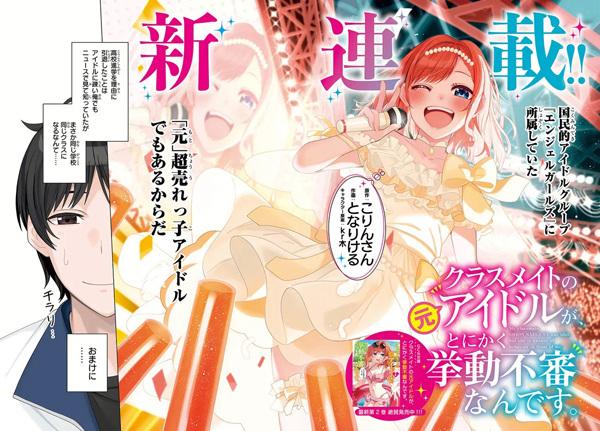
Introduction
In the diverse realm of Japanese light novels, “Classmate no Moto Idol ga Novel” has emerged as a captivating narrative that has intrigued readers with its blend of romance, drama, and slice-of-life elements. This novel, which translates to “My Former Idol Classmate is a Novel” in English, offers a fresh perspective on the classic themes of high school life and the transformative power of personal growth. This article delves into the intricacies of “Classmate no Moto Idol ga Novel,” examining its plot, character development, thematic elements, and impact on the light novel genre.
Plot Overview
“Classmate no Moto Idol ga Novel” centers around a seemingly ordinary high school student, Haruki Nakamura, whose life takes an unexpected turn when his former classmate, Yuki Aihara, returns to their school after a successful career as an idol. The novel explores the dynamics of their renewed relationship, revealing the complexities of Yuki’s past and the ways in which her experiences as an idol have shaped her present.
The story begins with Yuki’s return, which creates a ripple effect in Haruki’s life. Once a quiet and reserved student, Haruki finds himself caught between his memories of Yuki and the current reality of her celebrity status. The narrative weaves through their interactions, highlighting the contrasts between Yuki’s glamorous past and her desire for a more authentic connection with her peers.
As the plot unfolds, Haruki and Yuki’s relationship deepens, revealing layers of personal growth and emotional conflict. Their journey is marked by moments of nostalgia, self-discovery, and the struggle to reconcile their past with their present. “Classmate no Moto Idol ga Novel” captures the essence of their evolving bond, set against the backdrop of high school life and the challenges of fame.
Character Analysis

Central to “Classmate no Moto Idol ga Novel” is the nuanced portrayal of its main characters. Haruki Nakamura and Yuki Aihara are depicted with depth and complexity, making their interactions and personal growth a focal point of the narrative.
Haruki Nakamura
Haruki is characterized by his introspective nature and his struggle to navigate the changes brought about by Yuki’s return. Initially portrayed as a passive observer in his own life, Haruki’s character evolves as he confronts his feelings for Yuki and grapples with the impact of her celebrity status. His journey is marked by moments of self-doubt and growth, reflecting the broader themes of personal development and self-realization.
Yuki Aihara
Yuki Aihara, on the other hand, is a multifaceted character whose experiences as an idol have left a significant imprint on her personality. Her return to high school reveals the contrast between her public persona and her private self. Yuki’s character is explored through her interactions with Haruki and her attempts to reconnect with her past. Her struggles with fame, personal identity, and the expectations placed upon her are central to the novel’s emotional depth.
Thematic Exploration
“Classmate no Moto Idol ga Novel” delves into several themes that resonate with readers on both a personal and cultural level. These themes are interwoven throughout the narrative, contributing to the novel’s richness and complexity.
Identity and Transformation
One of the central themes of “Classmate no Moto Idol ga Novel” is the exploration of identity and transformation. Yuki’s transition from a high school student to a celebrity idol and back again highlights the fluid nature of personal identity. The novel examines how experiences shape individuals and how they reconcile different facets of themselves over time. Haruki’s own journey mirrors this theme, as he grapples with his evolving feelings for Yuki and his role in her life.
Fame and Authenticity
The contrast between Yuki’s public image and her personal struggles underscores the theme of fame versus authenticity. “Classmate no Moto Idol ga Novel” explores the impact of celebrity status on personal relationships and self-perception. Yuki’s desire for genuine connections despite her fame reflects a broader commentary on the pressures and challenges of living in the public eye.
Nostalgia and Memory
Nostalgia and memory play a significant role in the narrative, as Haruki and Yuki reflect on their past experiences and the ways in which they have shaped their present. The novel captures the bittersweet nature of looking back on one’s past and the process of reconciling those memories with current realities. This theme adds emotional depth to the story, enriching the reader’s engagement with the characters’ experiences.
Impact on the Light Novel Genre

It represents a significant contribution to the light novel genre, blending traditional elements with fresh perspectives. Its impact can be observed in several areas:
Narrative Innovation
The novel’s innovative approach to storytelling, combining high school drama with themes of fame and identity, offers a unique narrative experience. By exploring the complexities of celebrity culture and personal growth, “Classmate no Moto Idol ga Novel” adds depth to the light novel genre, challenging conventional tropes and offering a more nuanced portrayal of its characters.
Character Development
The detailed character development in “Classmate no Moto Idol ga Novel” sets it apart from other works in the genre. The complex portrayal of Haruki and Yuki, along with their emotional journey, reflects a growing trend in light novels toward more sophisticated and relatable characters. This focus on character-driven storytelling contributes to the novel’s appeal and its impact on readers.
Cultural Reflection
The novel also reflects broader cultural themes, particularly the intersection of fame and personal identity. By addressing the challenges faced by individuals in the public eye, “Classmate no Moto Idol ga Novel” offers a commentary on contemporary issues and resonates with readers who are familiar with the dynamics of celebrity culture.
Reception and Reviews
The reception of “Classmate no Moto Idol ga Novel” has been largely positive, with readers and critics praising its emotional depth and character development. The novel’s exploration of themes such as identity, fame, and nostalgia has been well-received, contributing to its success within the light novel community.
Reviews often highlight the novel’s ability to blend traditional light novel elements with contemporary issues, creating a compelling and thought-provoking narrative. The relatability of the characters and the authenticity of their experiences resonate with a diverse audience, enhancing the novel’s appeal.
Adaptations and Future Prospects

Given its popularity and critical acclaim, “Classmate no Moto Idol ga Novel” has attracted interest for potential adaptations. There are discussions about adapting the novel into other media formats, such as anime or live-action series. Such adaptations would introduce the story to a broader audience and offer new opportunities for exploring its themes and characters.
Looking ahead, it is likely to continue influencing the light novel genre and inspiring future works. Its innovative narrative approach and rich character development set a precedent for other authors and creators, contributing to the ongoing evolution of the genre.
Conclusion
“Classmate no Moto Idol ga Novel” stands out as a noteworthy contribution to the light novel genre, offering a compelling blend of romance, drama, and slice-of-life elements. Its exploration of themes such as identity, fame, and nostalgia provides a rich and nuanced narrative experience, resonating with readers and contributing to its impact on the genre.
The novel’s focus on character development, emotional depth, and cultural reflection sets it apart from other works, demonstrating its significance within the light novel community. As interest in potential adaptations grows, it is poised to continue influencing the genre and captivating audiences with its unique storytelling approach.


